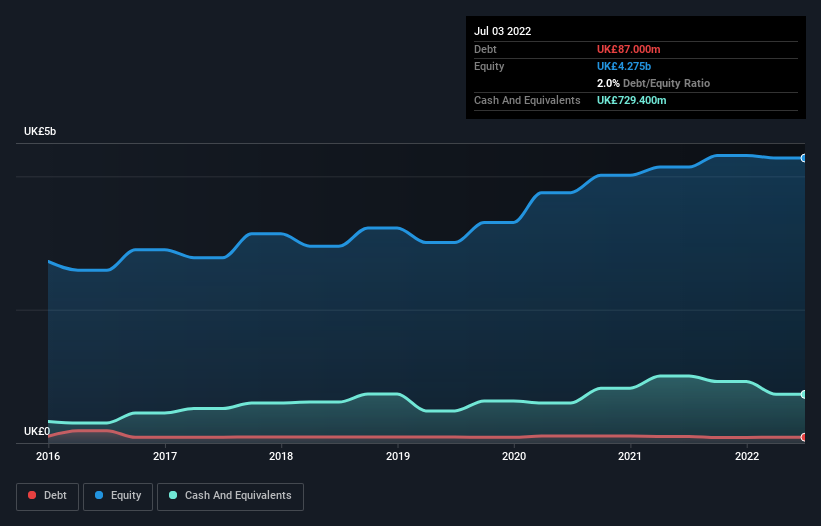- United Kingdom
- /
- Consumer Durables
- /
- LSE:TW.
We Think Taylor Wimpey (LON:TW.) Can Stay On Top Of Its Debt

Legendary fund manager Li Lu (who Charlie Munger backed) once said, 'The biggest investment risk is not the volatility of prices, but whether you will suffer a permanent loss of capital.' So it seems the smart money knows that debt - which is usually involved in bankruptcies - is a very important factor, when you assess how risky a company is. We note that Taylor Wimpey plc (LON:TW.) does have debt on its balance sheet. But the more important question is: how much risk is that debt creating?
When Is Debt Dangerous?
Generally speaking, debt only becomes a real problem when a company can't easily pay it off, either by raising capital or with its own cash flow. Part and parcel of capitalism is the process of 'creative destruction' where failed businesses are mercilessly liquidated by their bankers. While that is not too common, we often do see indebted companies permanently diluting shareholders because lenders force them to raise capital at a distressed price. Having said that, the most common situation is where a company manages its debt reasonably well - and to its own advantage. The first thing to do when considering how much debt a business uses is to look at its cash and debt together.
Check out the opportunities and risks within the GB Consumer Durables industry.
What Is Taylor Wimpey's Debt?
You can click the graphic below for the historical numbers, but it shows that Taylor Wimpey had UK£87.0m of debt in July 2022, down from UK£99.1m, one year before. But on the other hand it also has UK£729.4m in cash, leading to a UK£642.4m net cash position.

A Look At Taylor Wimpey's Liabilities
Zooming in on the latest balance sheet data, we can see that Taylor Wimpey had liabilities of UK£1.30b due within 12 months and liabilities of UK£852.1m due beyond that. On the other hand, it had cash of UK£729.4m and UK£192.6m worth of receivables due within a year. So it has liabilities totalling UK£1.23b more than its cash and near-term receivables, combined.
While this might seem like a lot, it is not so bad since Taylor Wimpey has a market capitalization of UK£3.66b, and so it could probably strengthen its balance sheet by raising capital if it needed to. However, it is still worthwhile taking a close look at its ability to pay off debt. While it does have liabilities worth noting, Taylor Wimpey also has more cash than debt, so we're pretty confident it can manage its debt safely.
Fortunately, Taylor Wimpey grew its EBIT by 8.6% in the last year, making that debt load look even more manageable. There's no doubt that we learn most about debt from the balance sheet. But ultimately the future profitability of the business will decide if Taylor Wimpey can strengthen its balance sheet over time. So if you want to see what the professionals think, you might find this free report on analyst profit forecasts to be interesting.
Finally, while the tax-man may adore accounting profits, lenders only accept cold hard cash. While Taylor Wimpey has net cash on its balance sheet, it's still worth taking a look at its ability to convert earnings before interest and tax (EBIT) to free cash flow, to help us understand how quickly it is building (or eroding) that cash balance. In the last three years, Taylor Wimpey's free cash flow amounted to 39% of its EBIT, less than we'd expect. That weak cash conversion makes it more difficult to handle indebtedness.
Summing Up
Although Taylor Wimpey's balance sheet isn't particularly strong, due to the total liabilities, it is clearly positive to see that it has net cash of UK£642.4m. On top of that, it increased its EBIT by 8.6% in the last twelve months. So we are not troubled with Taylor Wimpey's debt use. There's no doubt that we learn most about debt from the balance sheet. However, not all investment risk resides within the balance sheet - far from it. We've identified 2 warning signs with Taylor Wimpey (at least 1 which is potentially serious) , and understanding them should be part of your investment process.
Of course, if you're the type of investor who prefers buying stocks without the burden of debt, then don't hesitate to discover our exclusive list of net cash growth stocks, today.
Valuation is complex, but we're here to simplify it.
Discover if Taylor Wimpey might be undervalued or overvalued with our detailed analysis, featuring fair value estimates, potential risks, dividends, insider trades, and its financial condition.
Access Free AnalysisHave feedback on this article? Concerned about the content? Get in touch with us directly. Alternatively, email editorial-team (at) simplywallst.com.
This article by Simply Wall St is general in nature. We provide commentary based on historical data and analyst forecasts only using an unbiased methodology and our articles are not intended to be financial advice. It does not constitute a recommendation to buy or sell any stock, and does not take account of your objectives, or your financial situation. We aim to bring you long-term focused analysis driven by fundamental data. Note that our analysis may not factor in the latest price-sensitive company announcements or qualitative material. Simply Wall St has no position in any stocks mentioned.
About LSE:TW.
Flawless balance sheet and undervalued.


